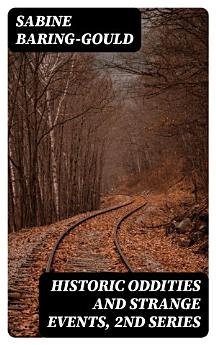Historic Oddities and Strange Events, 2nd Series
Sabine Baring-Gould
Sep 2022 · DigiCat
Ebook
258
Pages
family_home
Eligible
info
reportRatings and reviews aren’t verified Learn More
About this ebook
In 'Historic Oddities and Strange Events, 2nd Series,' Sabine Baring-Gould embarks on an enthralling exploration of peculiar happenings and curious anecdotes from history. With meticulous detail and an engaging narrative style, Baring-Gould weaves together a tapestry of unusual events that challenge conventional historical narratives. The book showcases his keen interest in folklore, myth, and the supernatural, presenting readers with captivating stories that straddle the lines between fact and fiction, while also reflecting the Victorian fascination with the bizarre and the occult. Sabine Baring-Gould, a prolific writer and scholar, was deeply influenced by his educational background and a lifelong passion for folklore and local history. His travels across England and Europe enriched his understanding of regional tales and eccentricities, which he sought to preserve through his writings. Baring-Gould's vibrant career includes contributions to various genres, but his unique voice in documenting the strange occurrences of the past sets him apart in the literary canon, driving his desire to enlighten readers about the curiosities of humanity. For those intrigued by the strange and the unexplained, Baring-Gould's 'Historic Oddities and Strange Events, 2nd Series' is a compelling read that promises both entertainment and enlightenment. As you traverse the pages, you will encounter stories that provoke thought and evoke wonder, making it a must-have for history enthusiasts and lovers of the peculiar alike.
About the author
Sabine Baring-Gould (1834–1924) was an English hagiographer, antiquarian, novelist, and eclectic scholar. He hailed from a family with diverse estates, which afforded him the financial stability to pursue a broad range of interests. Educated at Clare College, Cambridge, he was ordained in the Church of England and embarked on a lifelong commitment to writing and pastoral duties. His literary output was vast and varied, encompassing theology, folklore, history, and fiction. A quintessential Victorian, Baring-Gould's fascination with peculiar historical occurrences and legends is evident in works such as 'Historic Oddities and Strange Events, 2nd Series' (1891), which highlight his penchant for the macabre and the unusual situated within historical contexts. The eclectic nature of his written corpus serves as a testament to his insatiable curiosity and dedication to the preservation and exploration of cultural narratives. Baring-Gould also held notable influence in the realm of hymnody, authoring the enduring hymn 'Onward, Christian Soldiers.' His approach to literature was characterized by a didactic style, with a strong undercurrent of moral and social commentary, reflective of his clerical background and Victorian sensibilities. Despite achieving considerable popularity in his lifetime, much of Baring-Gould's work has since fallen into obscurity, with only a handful of texts, such as 'The Book of Were-Wolves' (1865), maintaining scholarly and cultural interest.
Rate this ebook
Tell us what you think.
Reading information
Smartphones and tablets
Install the Google Play Books app for Android and iPad/iPhone. It syncs automatically with your account and allows you to read online or offline wherever you are.
Laptops and computers
You can listen to audiobooks purchased on Google Play using your computer's web browser.
eReaders and other devices
To read on e-ink devices like Kobo eReaders, you'll need to download a file and transfer it to your device. Follow the detailed Help Center instructions to transfer the files to supported eReaders.








